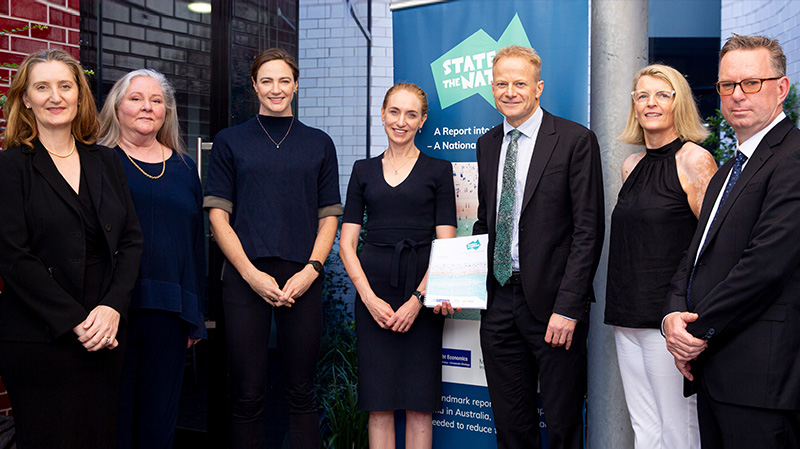Landmark report provides roadmap to zero deaths from melanoma, including national melanoma prevention and awareness program, better sun safety in high schools and sport, and targeted national melanoma screening program.
Australia’s leading melanoma clinical, research and support organisations are calling on Government to urgently provide increased action and funding to tackle the alarming incidence and impact of melanoma across the country.
The call follows today’s launch of State of the Nation – A Report into Melanoma, A National Health Priority – a landmark independent report by Insight Economics, which was jointly commissioned by the world’s leading melanoma research and treatment institute Melanoma Institute Australia (MIA) and national patient advocacy and support organisation Melanoma Patients Australia (MPA).
Watch the recording of the webinar launch below:
The Report involved widespread national input from melanoma patients, carers, clinicians, researchers and policy leaders over the last 18 months. It estimates that without critical action being taken, by 2030 a further 14,000 Australians will die from melanoma, 205,000 will be diagnosed with the disease, and the economic cost to the nation will be $8.7 billion.
The report also highlights that melanoma deaths in Australia exceed the road toll (1,384 vs 1,113 expected in 2020), yet road safety funding dramatically exceeds melanoma awareness and prevention funding.
‘This independent Report is wake-up call for all involved in funding melanoma health care, public health policies, and community interventions,’ said MIA Co-Medical Director Professor Richard Scolyer AO.
‘Whilst Australia has led the way in global melanoma research and treatment breakthroughs in the last decade, this Report for the first time highlights the enormity of the impact of melanoma on this country,’ added MIA Co-Medical Director Professor Georgina Long AO.
‘Importantly, the Report also provides a blueprint for how we can save lives and reduce this impact and we are calling on Governments to urgently provide long-term action and funding to support the critical recommendations outlined,’ added MPA CEO Victoria Beedle.
The Report outlines a five point strategy critical to achieving zero deaths from melanoma by 2030.
- Implement a national melanoma prevention and awareness campaign
- Invest in Australia’s high impact research
- Improve early detection and targeted screening programme
- Reduce variation in diagnosis and treatment
- Establish a model for melanoma supportive care and survivorship
Included in the five point strategy are 21 separate recommendations, which MIA and MPA are seeking urgent Government support for. These include:
- Long-term investment in a national prevention and early detection awareness strategy
- Improved sun-safety in secondary schools and on sporting fields
- Establishment of a nationally collaborative melanoma research mission, with a focus on melanoma biology, translational research and clinical trials
- Maintenance of melanoma clinical guidelines through a peak national body
- Development of evidence for a national targeted population screening program for melanoma
- Investment in GP training and development of a clinical standard of care for melanoma
- Increased supply of and access to professionals trained in skin checks
- Development of a model of care for melanoma survivors
- Funding for a national melanoma nurse support service.
Melanoma survivor and MIA National Ambassador, Olympian Cate Campbell, delivered the keynote address at the launch of the State of the Nation Report at MIA’s research and treatment centre in Sydney. Federal Health Minister, The Hon Greg Hunt, officially launched the Report via video link, with the event streamed live to melanoma patients, carers and health professionals across Australia.
‘I know first-hand that the ripple effect of a melanoma diagnosis is huge,’ Cate Campbell said. ‘This Report highlights that the impact of melanoma on Australians is at a critical point and more investment is needed particularly in sun safety and early detection programs if we are to reduce the burden of melanoma on future generations.’
‘The recommendations from this independent Report cover the gamut of melanoma awareness, prevention, early detection, treatment, research and ongoing patient care, and all require a coordinated and national approach in order to make an impact,’ MPA’s Victoria Beedle said.
‘Government commitment to each of these recommendations is critical if we are to make inroads in reducing the burden of melanoma,’ MIA’s Professor Long added. ‘This Report provides the roadmap, it is crucial that we heed the advice given and put plans in place and take action now,’ said Professor Scolyer.
#StateOfTheNation






[…] an ambitious target of zero deaths from melanoma by 2030 on the national health agenda in 2022 [link here] and recently followed up with the development and launch of the Australian Institute of Sport […]